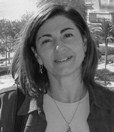Contact
Email:
amelia.polonia@gmail.com
Amélia Polonia is a visiting scholar at the Rachel Carson Center. She is currently an associate professor at the University of Porto in the Department of History, Political and International Studies, and is Director of the MA in African Studies.
She studied History at the University of Porto, where she was awarded her PhD (2000) and habilitation thesis (2009).
She is the scientific coordinator of “The Governance of Atlantic Ports,” and was a visiting fellow of the Institute for Latin American Studies at Freie Universität Berlin, as well as a guest professor at Goa University, University of Southern Brittany, The Hebrew University of Jerusalem and Brown University. Amélia is the chair of Portuguese Overseas Expansion at the University of Porto and her primary focus is colonial studies in the Early Modern Age. She focuses on the mechanisms of individual enterprise and informal participation in empire building processes (informal and self-organized). She applied network analysis and theories of cooperation and self-organization to her individual research and to the work teams she coordinated. Currently, she is researching the environmental impacts of colonial dynamics in the First Global Age, a multidisciplinary project linking some of the main strands of her career.
Research Project: Environmental Impacts of Colonial Dynamics: A Comparative Approach in the Colonial America(s). 1500–1700.
Selected publications:
- “The Environmental Impacts of the Historical Uses of the Seas in the First Global Age: Connection between Environmental History and Maritime History.” In Encyclopedia of Life Support Systems, Developed under the Auspices of the UNESCO, edited by Vladislav Kotchetkov (Oxford: EOLSS Publishers, 2014), available as part of the EOLSS project, http://www.eolss.net.
- “Think Globally, Act Locally: Environmental History as Global History in the First Global Age.” Asian Review of World Histories. Special issue 3–1 (Jan. 2015): 43–66.


